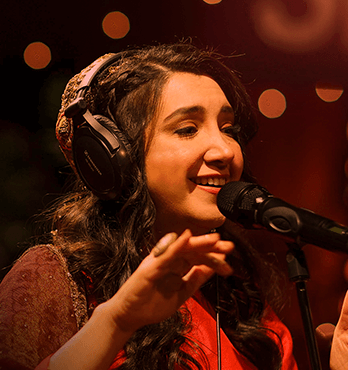Zebunnisa Bangash

by Ayesha binte Rashid
“I live everything through music. My understanding of the world: politics, philosophy, identity, spirituality, history, geography, is all through music.”
Zeb Bangash is an explorer and music is her map. When she talks about culture and history, her eyes light up, her conversation becomes more animated. She talks about raags found in regions that are far apart, about musical styles common to cultures that are completely different, and about the uniformities of languages. These are puzzles to Zeb, connections that she builds the more she delves into her study of music, language, and history.
“We know our history through the history of wars, not through the history of culture and its development,” says Zeb. “We interact with each other like there is no history between us. Like what has been written in decades-old newspapers is all that there is.” There is an innate empathy to these words, something that nudges us towards seeing things through another perspective; maybe through Zeb’s.
Zeb’s own history is woven off a love for stories. She was the kind of child who rejected toys in favor of company, wanting to listen to what people had to say, to connect and to understand the world around her. The person whose company she enjoyed most was her Nani’s (maternal grandmother) – her earliest memories of music being lullabies in her Nani’s voice, and songs woven into the Pashto stories her Nani would tell her at bedtime.
Her household was filled with music and poetry in a plethora of languages – Pashto, Darri, Persian, Turkish, Punjabi, Urdu and Hindko. Music was played in the car and could be heard coming from Zeb’s four siblings’ rooms. The family would gather at Zeb’s Nani’s house, eat pulao and, afterwards, a harmonium would be produced, a tabla would emerge, and the family would sing and recite poetry. Zeb’s household was a soundscape of ghazals, qawwalis, Bollywood music, and Turkish pop music.
The singer’s own tastes, unusual as they were for a child, gravitated towards classical music. A 7-year-old Zeb once sang Farida Khanum’s Maine Pairon Mein Payal at a school event, to the bemusement of gathered parents. She was particularly fascinated by the divas of the era– and who was a more iconic diva than Madam Noor Jehan? “I was very little. I saw her on the screen, and I sort of froze. I was mesmerized.” Not satisfied with merely watching, Zeb began imitating her. Every time Madam would appear on screen, Zeb would try to sing like her and emulate her expressions. Her Nani noticed this, catching on to Zeb’s ability to sing along with Madam and match the legend’s melody. At her Nani’s suggestion, Zeb’s father made sure that she was given musical lessons no matter where they lived from then on.
Given the abundance of music in her childhood, the practice of music was so innate that it was second nature. As she would play, she would sing. When she would learn something by heart for her school curriculum, she would give it a melody. Music lessons were part of her routine and music was the soundtrack to her family life. Given how it runs through her veins, it has become the lens through which she looks at the world: it is how she connects with people, it is how she finds the stories she so loves, and it is the map that guides her explorations.
The world that Zeb fantasizes about, one that existed long before our time, is a connected world. People travel with their music, their languages, their stories, and their religions. They exchange ideas, they listen to each other, and they celebrate uniqueness and diversity. Lahore is a city in which you hear both Punjabi and Persian. The Usmani emperors of Turkey rhyme in Persian. The poets of the subcontinent read verses out in Turkish. Nations are not a basis for identity. Divisions are fluid, permeable, not set in stone, and not a basis for distrust.
For Zeb, taking a moment to reflect on the past provides a sense of freedom that she finds solace in. Freedom from cultural divisions, from paradigms and even the future. “When I think of the future, I feel trapped,” she explains, “[and] the more I look at culture historically, the more I open up to myself.”
Zeb is drawn to folk music and poetry. She seeks it and it seeks her. When she connects with a piece of music or poetry, viscerally, she then begins to weave a story for herself. She stays with the story, creates it and recreates it. Sometimes for months, sometimes for years. Ever the explorer, this becomes an adventure she goes on with her piece of music. Once the story is completed, the music is created and released to the world.
Once her music is released, it is ours to find stories in. Stories that can be entirely our own. “If I have written a song on water and someone can smell the scent of flowers in it, then so be it.” She, does, after all, cherish freedom. For her, it is enough that her songs speak to us and form connections with us. And in this way, creates paths for others to find their own adventure through the freedom of exploration. We each become the Explorer.
